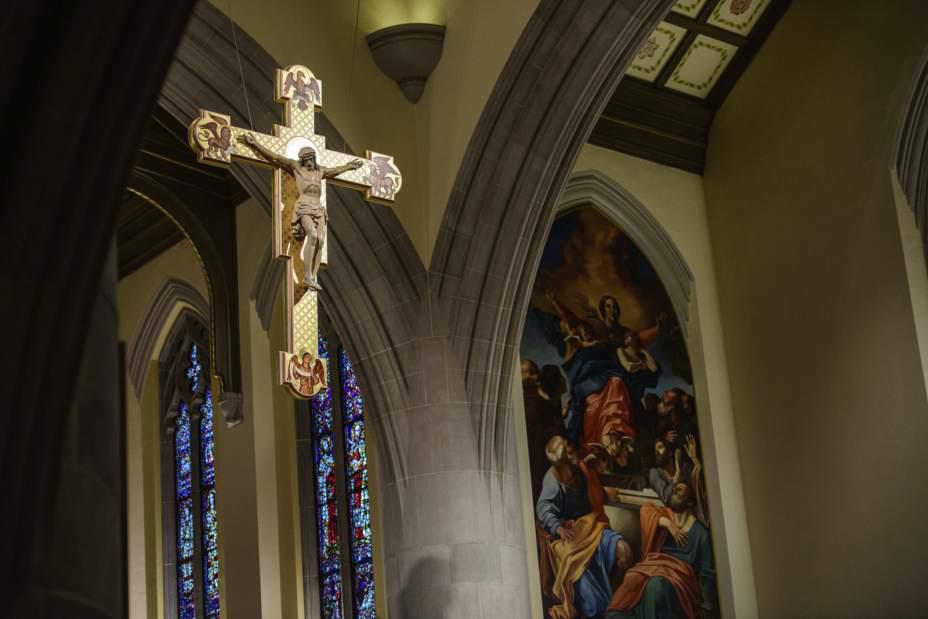|
Victim fund payouts don't cover non-clergy sex abuse
By Jamie Martines
Brother Frank Meder gave the Troy Hill neighborhood kids candy and soda when the old North Catholic High School cafeteria was closed on Saturdays. Sometimes he invited them to look at the stamp collection in his office. But first, he would molest them, according to one woman and four men whose accounts are detailed in the 2018 Pennsylvania grand jury report. Brother John Keegan, also a member of the Marianist religious order who worked at North Catholic, was accused of asking male students if he could "examine" their genitals. He allegedly read the minors explicit scripts and molested them. Abuse at the hands of these individuals — along with abuse committed by other members of religious orders named throughout the grand jury report — could go unacknowledged and uncompensated as the Diocese of Pittsburgh and other dioceses across the state set up and administer victim compensation programs. Survivors of abuse committed by members of religious orders like the Marianists, as well as by laypeople including teachers, janitors or other adults working in diocesan schools and parishes, will not be eligible to submit claims, according to details of the Pittsburgh program released this month by the diocese and the Washington-based law firm led by Kenneth Feinberg. The dioceses of Pittsburgh and Greensburg hired Feinberg's firm to design and administer the program. "The program will likely concern all allegations of abuse made by diocesan priests in Pittsburgh," Feinberg said of the Pittsburgh program. "I doubt that it will cover lay individuals." The program will resemble those administered by Feinberg in five New York dioceses, along with a recently established program in the Archdiocese of Philadelphia, he said. A spokesman for the Pittsburgh diocese said it may consider an additional phase to the program to resolve claims against lay individuals. The compensation fund program in the Diocese of Greensburg will cover priests who are members of religious orders, attorneys representing the diocese confirmed Saturday. Feinberg's firm is also developing funds for the dioceses of Allentown, Harrisburg and Scranton. Guidelines for the Archdiocese of Philadelphia program only provide compensation to victims by abuse by clergy of the archdiocese — no nuns, members of religious orders, lay teachers or other personnel, said Camille Biros, the firm's business manager. "There are allegations against other than clergy, but this program in its current format does not include those cases of abuse," she said. None of the programs Biros and Feinberg have administered included religious orders, though some programs in New York are considering adding a phase to address the issue, she said. The Marianist order did not agree to an interview, but instead issued a statement explaining that the order has a process for inviting survivors to come forward. Those survivors were contacted by a member of the order's leadership at that time, the statement said. Survivor's perspective "I think that's an area they overlooked," said Nanette Kirsch, a 1983 graduate of Mercyhurst Preparatory High School in the Diocese of Erie who was abused by a lay teacher from 1981 to 1982. He groomed her for abuse by singling her out over her grades or comparing her to a "favorite student" at a previous school, she said. As the abuse escalated to physical encounters, he became more possessive. He would sit near her mother at parent-teacher conferences and show up unannounced, just to remind her that he always had access to her world, she said. Her grades tanked. She was afraid and ashamed. "I was a Catholic school girl raised in a small town, and had never had any awareness of what abuse was," she said. Randolph Byrd, the science teacher Kirsch said abused her, is included on a public disclosure list maintained by the Erie Diocese outlining credible claims of abuse. The list includes lay individuals, like teachers, employees and other volunteers who worked in schools or agencies within the diocese as well as clergy. "We were surrounded by wolves, and no one was protecting us," she said. The Diocese of Erie will become the first — and so far, the only — program to consider claims involving abuse committed by lay individuals. Those survivors will be eligible to apply in the first phase of the program. "I was of the mind that we treat all of the victims the same," said Bishop Lawrence Persico of the Erie diocese. Kirsch, who is now 53 and lives in North Carolina, said she would consider participating in the fund if she's eligible. But she questions how much of a difference the fund could make. "What's missing to me in all of this is any real commitment to change the infrastructure," she said, adding that she would donate whatever reward she got to an organization that supports survivors. If she had the opportunity to face her abuser she would take it. "All I would want to do at this point is to say, 'I need you to understand that your selfish actions cost me a lot,' " she said. But survivors of abuse committed by members of religious orders will have to wait until the second phase of the program launches to find out whether the diocese will consider their claims. That's because religious order priests assigned to parishes are technically not diocesan personnel, Persico said. "They may have been working in the diocese, but they were not members of the diocese," Persico said.
|
.
Any original material on these pages is copyright © BishopAccountability.org 2004. Reproduce freely with attribution.
